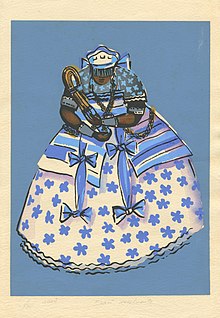
Back نانا بولوكو Arabic Nana Buruku German Nanán Baruqué Spanish Nana Buruku Italian Нана Булуку Macedonian Nana-Buluku Dutch Nanã Portuguese Nana-Buluku Swedish Nana Buluku Turkish 那那-布卢库 Chinese
| Nana Buluku | |
|---|---|
 Nanã as pictured in Candomblé. | |
| Venerated in | West African Vodun based religions (Candomblé, Louisiana Voodoo, Haitian Vodou) and Dahomean religion |
| Personal information | |
| Children | Mawu and Lisa |
Nana Buluku, also known as Nana Buruku, Nana Buku or Nanan-bouclou, is the female supreme being in the West African traditional religion of the Fon people (Benin, Dahomey) and the Ewe people (Togo).[1][2][3] She is one of the most influential deities in West African theology, and one shared by many ethnic groups other than the Fon people, albeit with variations. For example, she is called the Nana Bukuu among the Yoruba people and the Olisabuluwa among Igbo people but described differently, with some actively worshiping her while some do not worship her and worship the gods originating from her.[1][4]
In Dahomey mythology, Nana Buluku is the mother supreme creator who gave birth to the moon spirit Mawu, the sun spirit Lisa, and all of the universe. After giving birth to these, she retired and left the matters of the world to Mawu-Lisa. She is the primary creator, Mawu-Lisa the secondary creator, and the theology based on these is called Vodun, Voodoo or Vodoun.[5]
According to Maya Deren, some Vodouwizan believe that Nanan-bouclou is both male and female.[6]
- ^ a b Teresa N. Washington (2005). Our Mothers, Our Powers, Our Texts: Manifestations of Àjé in Africana Literature. Indiana University Press. pp. 63–64. ISBN 0-253-00319-9.
- ^ Greene, Sandra E. (1996). "Religion, History and the Supreme Gods of Africa: a Contribution To the Debate". Journal of Religion in Africa. 26 (2). Brill Academic Publishers: 122–138. doi:10.1163/157006696x00037.
- ^ Toyin Falola; Nana Akua Amponsah (2012). Women's Roles in Sub-Saharan Africa. ABC-CLIO. p. 70. ISBN 978-0-313-38545-2.
- ^ Geoffrey Parrinder (2014). West African Religion: A Study of the Beliefs and Practices of Akan, Ewe, Yoruba, Ibo, and Kindred Peoples. Wipf & Stock. pp. 28–29. ISBN 978-1-4982-0492-7.
- ^ Molefi Kete Asante; Ama Mazama (2009). Encyclopedia of African Religion. SAGE Publications. pp. 270–273. ISBN 978-1-4129-3636-1.
- ^ Divine Horsemen: The Living Gods of Haiti by Maya Deren, page 55
© MMXXIII Rich X Search. We shall prevail. All rights reserved. Rich X Search